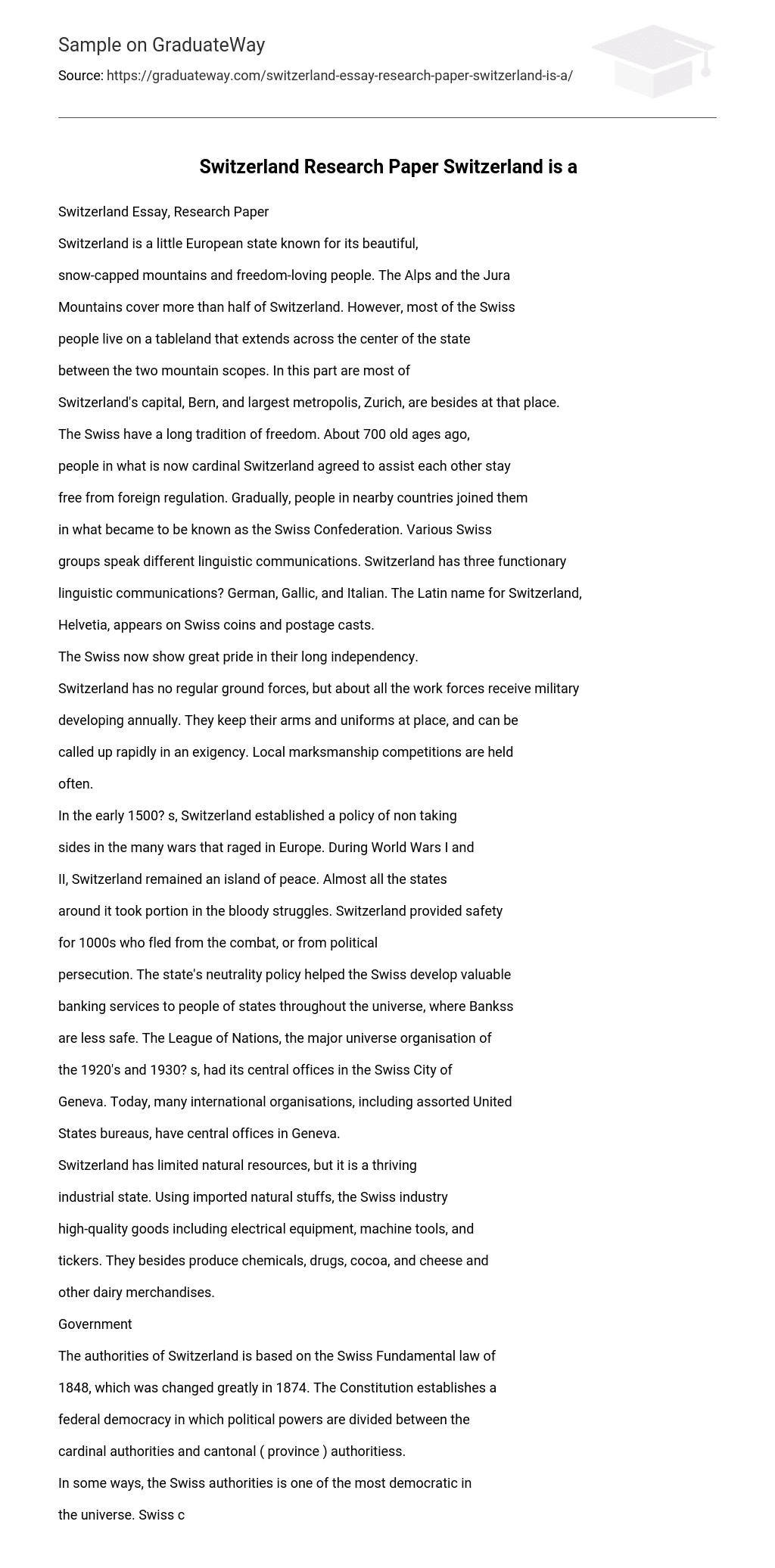Switzerland is a little European state known for its beautiful, snow-capped mountains and freedom-loving people. The Alps and the Jura Mountains cover more than half of Switzerland. However, most of the Swiss people live on a tableland that extends across the center of the state between the two mountain scopes. In this part are most of Switzerland’s capital, Bern, and largest metropolis, Zurich, are besides at that place.
The Swiss have a long tradition of freedom. About 700 old ages ago, people in what is now cardinal Switzerland agreed to assist each other stay free from foreign regulation. Gradually, people in nearby countries joined them in what became to be known as the Swiss Confederation. Various Swiss groups speak different linguistic communications. Switzerland has three functionary linguistic communications? German, Gallic, and Italian.
The Latin name for Switzerland, Helvetia, appears on Swiss coins and postage casts. The Swiss now show great pride in their long independency. Switzerland has no regular ground forces, but about all the work forces receive military developing annually. They keep their arms and uniforms at place, and can be called up rapidly in an exigency. Local marksmanship competitions are held often. In the early 1500? s, Switzerland established a policy of non taking sides in the many wars that raged in Europe. During World Wars I and II, Switzerland remained an island of peace. Almost all the states around it took portion in the bloody struggles. Switzerland provided safety for 1000s who fled from the combat, or from political persecution.
The state’s neutrality policy helped the Swiss develop valuable banking services to people of states throughout the universe, where Bankss are less safe. The League of Nations, the major universe organisation of the 1920’s and 1930? s, had its central offices in the Swiss City of Geneva. Today, many international organisations, including assorted United States bureaus, have central offices in Geneva. Switzerland has limited natural resources, but it is a thriving industrial state. Using imported natural stuffs, the Swiss industry high-quality goods including electrical equipment, machine tools, and tickers. They besides produce chemicals, drugs, cocoa, and cheese and other dairy merchandises. Government The authorities of Switzerland is based on the Swiss Fundamental law of 1848, which was changed greatly in 1874.
The Constitution establishes a federal democracy in which political powers are divided between the cardinal authorities and cantonal ( province ) authoritiess. In some ways, the Swiss authorities is one of the most democratic in the universe. Swiss citizens enjoy close control over their Torahs through the rights of the referendum and the enterprise. The referendum allows the people to demand a popular ballot on Torahs passed by the legislative assembly. A ballot must be held if 50,000 people request it. The people can so accept or blackball the jurisprudence. The inaugural gives Swiss citizens the right to bring particular issues before the people for a ballot. Such a ballot may coerce a alteration in authorities policy or may amend the Constitution.
An inaugural requires a request by at least 100,000 citizens. All electors must be at least 20 old ages old. Cantonal and local authorities. Swiss electors elect executive councils and legislative assemblies in the Guangzhous, half-cantons, and metropoliss. The state’s six half-cantons were originally three undivided Guangzhous. They split into separate political units with every bit much power of self-determination as the full Guangzhous. But each half-canton sends merely one representative to the national legislative assembly’s Council of States, alternatively of two.
In one Guangzhou and in four of the half-cantons, the people vote by a show of custodies at alfresco meeting called a Landsgemeinde. Similar meetings of electors are held in the little towns and small towns. Politicss. Switzerland has a broad scope of political parties. However, there are few differences among the big 1s. Therefore, the parties cooperate easy. The three largest political parties have about an equal grade of strength. They are the Christian Democratic Party, the Radical Democratic Party, and the Social Democratic Party. Defense. Switzerland has a reserves ( citizens ground forces ) alternatively of habitue armed forces. Swiss work forces are required to get down a series of military-training periods at the age of 20. They can be called into service until the age of 50.
Men whose wellness or work makes them unable to function in the reserves and work forces who live out of the state must pay a particular revenue enhancement. Peoples Even after the Swiss began to fall in forces about 700 old ages ago to defend themselves, people from different countries kept their ain ways of life. They defended these ways of life in the same spirit of independency that has made Switzerland celebrated. Therefore, the Swiss still differ greatly among themselves in linguistic communication, imposts, and traditions. These fluctuations are evident from part to part, and even among some little communities.
In the yesteryear, the local nationalism of the Swiss was so strong that most of them idea of themselves as portion of their ain local country more than of their state. They considered the Swiss of other countries about foreign challengers, and feuds among assorted countries lasted for 100s of old ages. But at most when their state faced danger, the Swiss stood together as one people.
Today, local nationalism has mostly been replaced by national nationalism. Population. Switzerland has approximately 7 million people. About 1 million of the people are nonnative. About a 3rd of the state s nonnative population came from Italy. Large groups of people from France, West Germany, and Spain besides reside in Switzerland. Switzerland has a larger per centum of nonnative occupants than any other European state. Foreign workers have been recruited to make full freshly created occupations, because Switzerland’s economic system has grown quicker than its domestic population.





